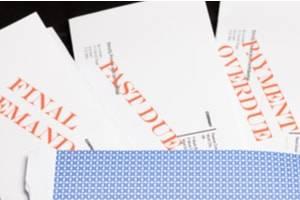 312-704-0771
312-704-0771
Recent Blog Posts
Retrieving Debt from Third-Party Assets
 When a court rules in favor of a creditor who has filed a lawsuit against a debtor, that creditor becomes a judgment creditor. This status gives a judgment creditor in Illinois several methods by which it can collect on the debt, such as filing a citation to discover the debtor’s assets and obtaining a judgment lien against a debtor’s property. It is wise to also look into any third-party assets that the debtor can claim, such as bank holdings and people who owe the debtor money. Third-party assets may help you in retrieving a debt if the debtor’s own assets are not enough.
When a court rules in favor of a creditor who has filed a lawsuit against a debtor, that creditor becomes a judgment creditor. This status gives a judgment creditor in Illinois several methods by which it can collect on the debt, such as filing a citation to discover the debtor’s assets and obtaining a judgment lien against a debtor’s property. It is wise to also look into any third-party assets that the debtor can claim, such as bank holdings and people who owe the debtor money. Third-party assets may help you in retrieving a debt if the debtor’s own assets are not enough.
Third-Party Discovery
If you believe that a third party may be holding some of your judgment debtor’s assets, you will need to file a citation for discovery with that party. The debtor must also be notified of the third-party citation. The third party is required to respond to your citation, even if they do not hold any of the debtor’s assets. If they fail to respond, you can receive a conditional judgment against the third party for what the judgment debtor owes.
What Are the Benefits and Risks of Invoice Factoring?
 Business owners are often receptive to creative ways that they can secure loans from financing companies. Invoice factoring, also known as accounts receivable factoring, is an alternative form of funding that has grown in popularity. Factoring is a collateral-backed loan, with the collateral being the business’s unpaid customer invoices. The lender purchases the invoices and receives payments from the borrower’s customers in order to be reimbursed for the loan. While there are benefits to using factoring to create a loan agreement, creditors should also understand the risks that may be involved.
Business owners are often receptive to creative ways that they can secure loans from financing companies. Invoice factoring, also known as accounts receivable factoring, is an alternative form of funding that has grown in popularity. Factoring is a collateral-backed loan, with the collateral being the business’s unpaid customer invoices. The lender purchases the invoices and receives payments from the borrower’s customers in order to be reimbursed for the loan. While there are benefits to using factoring to create a loan agreement, creditors should also understand the risks that may be involved.
Benefits
Factoring gives creditors more flexibility when working with a business client that does not have a strong credit history. From the borrower’s perspective, they are quickly turning their invoices into cash that they can use for immediate expenses. From the lender’s perspective, they are purchasing current customer invoices and could be repaid for the loan in a matter of months, depending on when the invoices are due. If the process goes smoothly, the creditor will have created a successful business relationship with a client that may not have qualified for a loan otherwise.
Should You Foreclose on a Property with a Judgment Lien?
 An unsecured creditor can secure their claim on a debt by receiving a judgment lien. If a court finds in favor of the creditor in a lawsuit, the creditor can request that a lien be put on the debtor’s property – most often their home. If the debtor tries to sell the house, the buyer or seller must pay the lien before ownership can be transferred. The lien would also make them a junior creditor if another creditor foreclosed on the property. As a creditor with a judgment lien, you may wonder whether you can initiate a foreclosure on the property. While you do have that right, there are several reasons why foreclosing on a judgment lien may not be worth your effort:
An unsecured creditor can secure their claim on a debt by receiving a judgment lien. If a court finds in favor of the creditor in a lawsuit, the creditor can request that a lien be put on the debtor’s property – most often their home. If the debtor tries to sell the house, the buyer or seller must pay the lien before ownership can be transferred. The lien would also make them a junior creditor if another creditor foreclosed on the property. As a creditor with a judgment lien, you may wonder whether you can initiate a foreclosure on the property. While you do have that right, there are several reasons why foreclosing on a judgment lien may not be worth your effort:
Sale Process: Forcing a sale on a home will cost both time and money. You will need to publish a listing of the sale and pay a fee to the local sheriff’s department to hold the property. You will also need to hire a real estate attorney to ensure that the sale is legal. Once you are able to sell the property, you will be required to give the debtor time to repay the lien. The whole process could take the better part of a year, with no guarantee of success.
Four Ways Banks Can Improve Their Debt Collection Process
 Common creditors such as banks will usually explore various means of collecting debts before they choose litigation. Filing a lawsuit for every debt collection dispute would be costly and hurt their relationship with potentially valuable clients. There are many cases that banks can resolve internally by working with the debtor. However, an inefficient debt collection process may ultimately be a waste of resources because of its low success rate. Adjusting your debt collection strategy may help you more effectively recover outstanding debts and understand when litigation is necessary:
Common creditors such as banks will usually explore various means of collecting debts before they choose litigation. Filing a lawsuit for every debt collection dispute would be costly and hurt their relationship with potentially valuable clients. There are many cases that banks can resolve internally by working with the debtor. However, an inefficient debt collection process may ultimately be a waste of resources because of its low success rate. Adjusting your debt collection strategy may help you more effectively recover outstanding debts and understand when litigation is necessary:
- Collect and Verify Client Information: It is difficult to start your debt collection process if you cannot find the client. When entering the debt agreement, you should ask the client for personal information, such as their address, phone number, place of work, driver’s license, social security number, and personal references. If you are unable to reach the client with this information, check with government agencies and other third parties to see if your information is out-of-date.
Contesting Bankruptcy Fraud from Holiday Shoppers
 The average U.S. consumer takes on more than $1,000 in debt each December – much of it related to holiday shopping and put on credit cards. When it comes time to repay those debts, some consumers struggle to keep up with minimum payments and eventually default on their debts. Debtors who qualify for bankruptcy can put unsecured creditors such as credit card companies in a difficult position because the debtor may be able to discharge all or part of their credit card debt at the end of the bankruptcy. Creditors can stop or limit the bankruptcy process if they can show that the debtor is trying to commit fraud.
The average U.S. consumer takes on more than $1,000 in debt each December – much of it related to holiday shopping and put on credit cards. When it comes time to repay those debts, some consumers struggle to keep up with minimum payments and eventually default on their debts. Debtors who qualify for bankruptcy can put unsecured creditors such as credit card companies in a difficult position because the debtor may be able to discharge all or part of their credit card debt at the end of the bankruptcy. Creditors can stop or limit the bankruptcy process if they can show that the debtor is trying to commit fraud.
Amassing Debt
One way that bankruptcy fraud can occur is when the filer takes on debt that they never intended to repay. For instance, a debtor who intends to file for bankruptcy may use a credit card to purchase gifts for the holidays because they believe that they can discharge the debt later. The credit card company may suspect the debtor’s intention and can file a claim of fraud with the bankruptcy court. If the claim is proven, the court may order that the fraudulent debt is ineligible for discharge or dismiss the case.
How Joint Bank Accounts Affect Garnishment
 When you receive a favorable judgment against a debtor in a lawsuit, you will have a variety of sources from which you can retrieve the debt owed to you. Many people hold a majority of their money in bank accounts, and you can use non-wage garnishment to access that money if the debtor has not been using it to repay you. When you receive a garnishment order from the court, the debtor or other interested parties have an opportunity to contest the order and protect that money. In some cases, a person who shares the account with the debtor may try to block your garnishment order.
When you receive a favorable judgment against a debtor in a lawsuit, you will have a variety of sources from which you can retrieve the debt owed to you. Many people hold a majority of their money in bank accounts, and you can use non-wage garnishment to access that money if the debtor has not been using it to repay you. When you receive a garnishment order from the court, the debtor or other interested parties have an opportunity to contest the order and protect that money. In some cases, a person who shares the account with the debtor may try to block your garnishment order.
Non-Wage Garnishment
First, let us review the rules of non-wage garnishment during debt collection. Non-wage garnishment is a court order to withdraw money from sources other than the debtor’s pay from work. Bank accounts and physical assets are the most common sources for non-wage garnishment and can potentially be more valuable than the debtor’s wages. However, there are restrictions on non-wage garnishment:
Using Replevin, Detinue to Repossess Vehicles
 As a secured creditor, there may come a point in the debt collection process when you decide that you are best served by repossessing the collateral property. Auto lenders commonly deal with repossessing vehicles when the debtor defaults on their loan and shows no intention of working with the lender to catch up on the missed payments. However, debtors may not cooperate when you try to repossess their vehicle, whether they actively deny your repossession efforts or try to hide the vehicle from you. In these situations, you can force compliance by requesting a replevin or detinue from the court.
As a secured creditor, there may come a point in the debt collection process when you decide that you are best served by repossessing the collateral property. Auto lenders commonly deal with repossessing vehicles when the debtor defaults on their loan and shows no intention of working with the lender to catch up on the missed payments. However, debtors may not cooperate when you try to repossess their vehicle, whether they actively deny your repossession efforts or try to hide the vehicle from you. In these situations, you can force compliance by requesting a replevin or detinue from the court.
What Are Replevin and Detinue?
Replevin and detinue are similar legal actions that can help you recover a property held by a debtor. The main differences are:
- Replevin allows police to seize property and return it to the creditor and is more generally used when a defendant wrongfully took a property.
Consequences of Violating an Automatic Stay During Bankruptcy
 When a debtor files for bankruptcy protection, the court will put an automatic stay on collecting the debt. This means that creditors must stop contacting the debtor with collection notices or attempting to repossess collateral properties until the bankruptcy is completed or the stay is otherwise lifted. Violating the stay is a serious offense that may result in court fines or the debtor filing a lawsuit against you. The severity of the penalty depends on whether you knowingly violated the stay and whether you continued to violate it after being told to stop.
When a debtor files for bankruptcy protection, the court will put an automatic stay on collecting the debt. This means that creditors must stop contacting the debtor with collection notices or attempting to repossess collateral properties until the bankruptcy is completed or the stay is otherwise lifted. Violating the stay is a serious offense that may result in court fines or the debtor filing a lawsuit against you. The severity of the penalty depends on whether you knowingly violated the stay and whether you continued to violate it after being told to stop.
Violation Examples
Once it is confirmed that you received notice of the debtor’s bankruptcy filing, you are expected to comply with the automatic stay. This means you are not allowed to:
- Send letters to the debtor demanding repayment
Four Arguments for Denying Chapter 7 Bankruptcy Discharge
 The primary reason that creditors do not want debtors to file for bankruptcy is the possibility of discharging the debt. At the end of a Chapter 7 bankruptcy case, the court will discharge most of the remaining debts that were not paid from the sale of nonexempt assets. Secured creditors can repossess the collateral property but cannot collect on the loan balance without a reaffirmation agreement. Debts to unsecured creditors may be completely wiped out. Creditors can attempt to deny the discharge of their debts by using an adversary proceeding against the bankruptcy filer. They must prove that the debtor is attempting to defraud them through bankruptcy. There are several reasons why a court may agree to deny the discharge of debts:
The primary reason that creditors do not want debtors to file for bankruptcy is the possibility of discharging the debt. At the end of a Chapter 7 bankruptcy case, the court will discharge most of the remaining debts that were not paid from the sale of nonexempt assets. Secured creditors can repossess the collateral property but cannot collect on the loan balance without a reaffirmation agreement. Debts to unsecured creditors may be completely wiped out. Creditors can attempt to deny the discharge of their debts by using an adversary proceeding against the bankruptcy filer. They must prove that the debtor is attempting to defraud them through bankruptcy. There are several reasons why a court may agree to deny the discharge of debts:
- Lying During Bankruptcy: A debtor may abuse the bankruptcy process in order to discharge debts that they are capable of paying. A court may deny the discharge of all debts if the debtor lied or withheld information with the intent to defraud the creditors and manipulate the system.
Assessing the Risk of Modifying a Commercial Loan
 Lending to a commercial borrower has the potential to be more lucrative to a creditor than lending to a consumer borrower. The average consumer borrower will take out one major loan during their lifetime – a home mortgage. A successful business may continue to take out loans as it expands its operations, creating a long-term business relationship with the lender. There are risks when lending to a commercial borrower if the business struggles. Creditors know they must evaluate the likelihood that a business will be able to repay them before entering a loan agreement. They may need to adjust their evaluation if the commercial debtor falls behind on its loan payments.
Lending to a commercial borrower has the potential to be more lucrative to a creditor than lending to a consumer borrower. The average consumer borrower will take out one major loan during their lifetime – a home mortgage. A successful business may continue to take out loans as it expands its operations, creating a long-term business relationship with the lender. There are risks when lending to a commercial borrower if the business struggles. Creditors know they must evaluate the likelihood that a business will be able to repay them before entering a loan agreement. They may need to adjust their evaluation if the commercial debtor falls behind on its loan payments.
Creditor Options
When a commercial debtor misses a payment, the one thing you cannot afford to do as a creditor is to ignore it. You should respond to the first missed payment by contacting the debtor to determine the reason for the missed payment. If the missed payments continue for several months, you have a difficult decision to make. You can:






